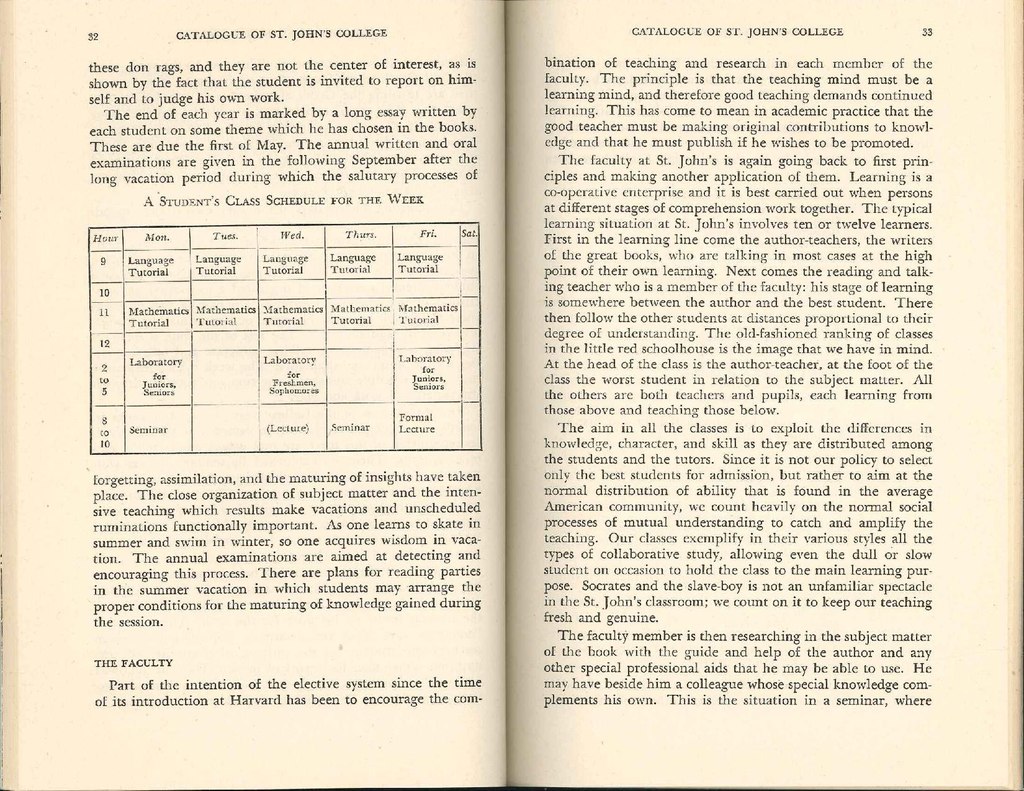these don rags, and they are not the center of interest, as is shown by the fact that the student is invited to report on himself and to judge his own work.
The end of each year is marked by a long essay written by each student on some theme which he has chosen in the books. These are due the first of May. The annual written and oral examinations are given in the following September after the long vacation period during which the salutary processes of
A Student's Class Schedule for the Week
| Hour | Mon. | Tue. | Wed. | Thurs. | Fri. | Sat. |
|---|---|---|---|---|---|---|
| 9 | Language Tutorial |
Language Tutorial |
Language Tutorial |
Language Tutorial |
Language Tutorial |
|
| 10 | ||||||
| 11 | Mathematics Tutorial |
Mathematics Tutorial |
Mathematics Tutorial |
Mathematics Tutorial |
Mathematics Tutorial |
|
| 12 | ||||||
| 2 to 5 |
Laboratory for Juniors, Seniors |
Laboratory for Juniors, Seniors |
Laboratory for Juniors, Seniors |
|||
| 8 to 10 |
Seminar | (Lecture) | Seminar | Formal Lecture |
forgetting, assimilation, and the maturing of insights have taken place. The close organization of subject matter and the intensive teaching which results make vacations and unscheduled ruminations functionally important. As one learns to skate in summer and swim in winter, so one acquires wisdom in vacation. The annual examinations are aimed at detecting and encouraging this process. There are plans for reading parties in the summer vacation in which students may arrange the proper conditions for the maturing of knowledge gained during the session.
the faculty
Part of the intention of the elective system since the time of its introduction at Harvard has been to encourage the combination of teaching and research in each member of the faculty. The principle is that the teaching mind must be a learning mind, and therefore good teaching demands continued learning. This has come to mean in academic practice that the good teacher must be making original contributions to knowledge and that he must publish if he wishes to be promoted.
The faculty at St. John's is again going back to first principles and making another application of them. Learning is a co-operative enterprise and it is best carried out when persons at different stages of comprehension work together. The typical learning situation at St. John's involves ten or twelve learners. First in the learning line come the author-teachers, the writers of the great books, who are talking in most cases at the high point of their own learning. Next comes the reading and talking teacher who is a member of the faculty: his stage of learning is somewhere between the author and the best student. There then follow the other students at distances proportional to their degree of understanding. The old-fashioned ranking of classes in the little red schoolhouse is the image that we have in mind. At the head of the class is the author-teacher, at the foot of the class the worst student in relation to the subject matter. All the others are both teachers and pupils, each learning from those above and teaching those below.
The aim in all the classes is to exploit the differences in knowledge, character, and skill as they are distributed among the students and the tutors. Since it is not our policy to select only the best students for admission, but rather to aim at the normal distribution of ability that is found in the average American community, we count heavily on the normal social processes of mutual understanding to catch and amplify the teaching. Our classes exemplify in their various styles all the types of collaborative study, allowing even the dull or slow student on occasion to hold the class to the main learning purpose. Socrates and the slave-boy is not an unfamiliar spectacle in the St. John's classroom; we count on it to keep our teaching fresh and genuine.
The faculty member is then researching in the subject matter of the book with the guide and help of the author and any other special professional aids that he may be able to use. He may have beside him a colleague whose special knowledge complements his own. This is the situation in a seminar, where
